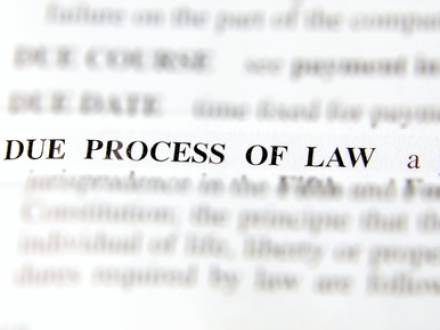Recent Blog Posts
Are Police Allowed To Arrest You for Public Sex in Texas if No One Saw?
 You are facing a potential public lewdness charge, but you are certain no one witnessed anything. So how can law enforcement move forward with an arrest? The reality is more complex than most expect. Texas prosecutors do not always need an eyewitness to pursue public lewdness charges. The first step in building your defense is to find a Collin County, TX sex crimes defense lawyer. At The Crowder Law Firm, P.C., we can help you understand how the court may view the circumstances of your case so you can make informed decisions.
You are facing a potential public lewdness charge, but you are certain no one witnessed anything. So how can law enforcement move forward with an arrest? The reality is more complex than most expect. Texas prosecutors do not always need an eyewitness to pursue public lewdness charges. The first step in building your defense is to find a Collin County, TX sex crimes defense lawyer. At The Crowder Law Firm, P.C., we can help you understand how the court may view the circumstances of your case so you can make informed decisions.
How Texas Law Defines Public Lewdness
Texas law does not use the term "public sex" as a formal charge. Instead, these cases are typically handled as public lewdness. Under Texas Penal Code § 21.07, public lewdness can involve engaging in certain sexual conduct in a public place. It can also apply in a private place if there is a risk that someone else could see it and be offended.
How Do I Fight a Child Endangerment Charge in Texas?
 If you are facing a child endangerment charge, the first thing you need to do is seek legal guidance. Understanding your rights is how you make good choices about your defense.
If you are facing a child endangerment charge, the first thing you need to do is seek legal guidance. Understanding your rights is how you make good choices about your defense.
Our Plano, TX child endangerment defense lawyer has the experience necessary to analyze the details of your case and help you challenge the allegations against you.
What Is Considered Child Endangerment Under Texas Law?
Child endangerment is usually charged under Texas Penal Code § 22.041. This law applies when someone is accused of placing a child in a situation that could expose the child to harm. The law allows charges based on different levels of behavior, including careless actions. This means the state does not have to prove that you meant to cause harm. Investigators often review supervision, environment, and access to unsafe items when deciding whether to move forward with a case.
How Federal Law Intersects With Texas Revenge Porn Law
 Intentionally sharing private photos or videos of someone without their consent can lead to criminal charges. Depending on how and where the images were shared, the case may involve both state and federal law. When you are dealing with digital evidence or interstate communication, it can get much more complicated.
Intentionally sharing private photos or videos of someone without their consent can lead to criminal charges. Depending on how and where the images were shared, the case may involve both state and federal law. When you are dealing with digital evidence or interstate communication, it can get much more complicated.
You need an experienced Collin County, TX revenge porn defense lawyer on your side. At The Crowder Law Firm, P.C., we handle state and federal sex crimes cases. We can help you fight the allegations against you with a strong defense strategy.
What Does Texas Law Say About Revenge Porn?
Under Texas Penal Code § 21.16, a person can face charges for intentionally disclosing or showing photos or videos that include another person who is nude or engaged in sexual activity when the disclosure is made without that person’s effective consent.
Can You Go to Prison for Being a Minor Attracted Person if You Never Act On It?
 Everyone knows that sexual activity between adults and minors is almost always against the law; however, some people wonder whether their attraction to minors is illegal in and of itself. If this is a question you have, it is important to know the truth. In Texas, you cannot go to prison for a thought alone. You can only face criminal charges if you take a step that breaks a specific law.
Everyone knows that sexual activity between adults and minors is almost always against the law; however, some people wonder whether their attraction to minors is illegal in and of itself. If this is a question you have, it is important to know the truth. In Texas, you cannot go to prison for a thought alone. You can only face criminal charges if you take a step that breaks a specific law.
That being said, Texas has some of the strictest laws in the country when it comes to crimes against children. Understanding where the legal line is can help you avoid a charge that changes your life forever. If you are being investigated for or charged with crimes against children in 2025, call our Plano, TX criminal defense attorney right away.
When Does Texas Actually Criminalize Minor Attracted Adults?
Texas does not punish someone simply for having an attraction. Texas punishes conduct. This includes actions that involve a child or actions taken toward committing a crime against a child. Some examples include:
What to Do if the Police Are Investigating You for CSAM
 The FBI or local police show up at your door with a search warrant. They seize your computer, phone, and other devices. They tell you they are investigating child sexual abuse material. What do you do now?
The FBI or local police show up at your door with a search warrant. They seize your computer, phone, and other devices. They tell you they are investigating child sexual abuse material. What do you do now?
Discovering that you are under investigation for possession or distribution of lolliporn, or child pornography, can be terrifying. Texas Penal Code § 43.26 categorizes these crimes as felonies, with severe penalties including decades in prison and lifetime sex offender registration. What you do in the next hours and days can make the difference between conviction and acquittal. Call our Plano criminal defense attorney for sex crimes against children. We believe in your constitutional right to presumed innocence.
Should You Talk to the Police if They’re Investigating You for Child Porn?
Do not talk to investigators without a lawyer present. This is the most important advice you will receive. Police and federal agents are trained to get confessions and they will tell you it will be better if you cooperate.
What Happens if You Give Someone a Date Rape Drug?
 In Texas, giving someone a drug without their consent is one of the most serious accusations you can face. These cases often involve additional accusations of sexual assault or trying to commit sexual assault. Even being accused of giving someone a so-called "date rape drug" can destroy your reputation, career, and freedom.
In Texas, giving someone a drug without their consent is one of the most serious accusations you can face. These cases often involve additional accusations of sexual assault or trying to commit sexual assault. Even being accused of giving someone a so-called "date rape drug" can destroy your reputation, career, and freedom.
If you are under investigation or charged with giving someone a date rape drug, you need a good Plano criminal defense lawyer right away. At The Crowder Law Firm, P.C., we are not afraid of the prosecutors or allegations of serious crimes. We fight for every client. Call us today.
What Counts as a "Date Rape Drug?"
Texas law does not define giving someone a "date rape drug" as a specific crime. Instead, prosecutors file charges under different sections of the Texas Penal Code depending on what allegedly happened.
How Does a Child Sexual Assault Case Become Federal?
 A conviction in federal court for sexually abusing a child can lead to decades in prison, lifetime registration as a sex offender, and permanent damage to your reputation and future. If you have been accused of child sexual assault in Texas, you need to know when and why a case might be prosecuted federally.
A conviction in federal court for sexually abusing a child can lead to decades in prison, lifetime registration as a sex offender, and permanent damage to your reputation and future. If you have been accused of child sexual assault in Texas, you need to know when and why a case might be prosecuted federally.
Get answers to your questions and the help you need from a Texas federal criminal defense attorney with experience fighting federal child sex abuse charges.
What Makes a Child Sexual Assault Case a Federal Crime?
Most sexual assault cases, including those involving minors, are handled by state courts under Texas law. However, certain factors can cause a case to fall under federal jurisdiction. These typically involve conduct that crosses state lines, uses federal property, or violates federal statutes.
Can You Be Convicted of a Sex Crime Against a Child Just Based on an Accusation?
 Few criminal allegations are as serious as being accused of a sex crime involving a child. Theoretically, everyone is innocent until proven guilty. In real life, these cases can destroy the life of the person being accused long before a verdict is reached in court. Because of this, one of the most common questions people ask after being accused is whether you can be convicted of a sex crime against a child based solely on an allegation.
Few criminal allegations are as serious as being accused of a sex crime involving a child. Theoretically, everyone is innocent until proven guilty. In real life, these cases can destroy the life of the person being accused long before a verdict is reached in court. Because of this, one of the most common questions people ask after being accused is whether you can be convicted of a sex crime against a child based solely on an allegation.
If someone has accused you of committing a sex crime against a child, you need a lawyer who is not afraid to stand up for your rights in public. At The Crowder Law Firm, P.C., our Plano, TX criminal defense lawyer has defended clients against the most serious accusations imaginable and has still won hundreds of not-guilty verdicts. Call us at 214-544-0061 now.
Can You Be Charged with a Crime if Your Dog Seriously Injures or Kills Someone?
 When your family pet or guard dog attacks someone, the incident can quickly turn into a criminal case. In Texas, you can face criminal negligence or even manslaughter charges if prosecutors think you did not control a dangerous animal. These charges can carry years in prison and permanent damage to your reputation.
When your family pet or guard dog attacks someone, the incident can quickly turn into a criminal case. In Texas, you can face criminal negligence or even manslaughter charges if prosecutors think you did not control a dangerous animal. These charges can carry years in prison and permanent damage to your reputation.
After a major animal attack, emergency responders arrive, animal control investigates, and police start asking questions. When the injuries are serious or fatal, the case moves into the criminal courts. At that point, you need an experienced Collin County criminal defense attorney who understands how to challenge every aspect of the state’s case.
What Does "Criminal Negligence" Mean in a Texas Animal Attack Case?
Texas Health and Safety Code § 822.005 allows prosecutors to charge an owner criminally if a dog causes serious injury or death and the owner was criminally negligent.
How Serious Is an Arson Charge in Texas?
 Arson is a felony offense in Texas and is prosecuted very seriously. Even a small fire can lead to a long prison sentence, and certain factors can make the penalties even harsher. If you have been accused of arson, a Collin County, TX criminal defense attorney can help fight for your rights in court.
Arson is a felony offense in Texas and is prosecuted very seriously. Even a small fire can lead to a long prison sentence, and certain factors can make the penalties even harsher. If you have been accused of arson, a Collin County, TX criminal defense attorney can help fight for your rights in court.
At The Crowder Law Firm, P.C., we have a long history of representing clients charged with serious crimes. Attorney Darlina C. Crowder has over 25 years of experience in criminal defense, and she has handled high-profile cases across the state of Texas with favorable results. We can help you navigate an arson charge, considering all possible defenses given the circumstances of your case.
What Qualifies as Arson Under State Law?
In Texas, the crime of arson is defined as setting a fire or setting off an explosion for the purpose of destroying or damaging protected property, including vegetation on open-space land (Texas Penal Code Sec. 28.02). Additionally, you could face criminal charges if you set a fire with reckless disregard for the safety of other people or property.
















